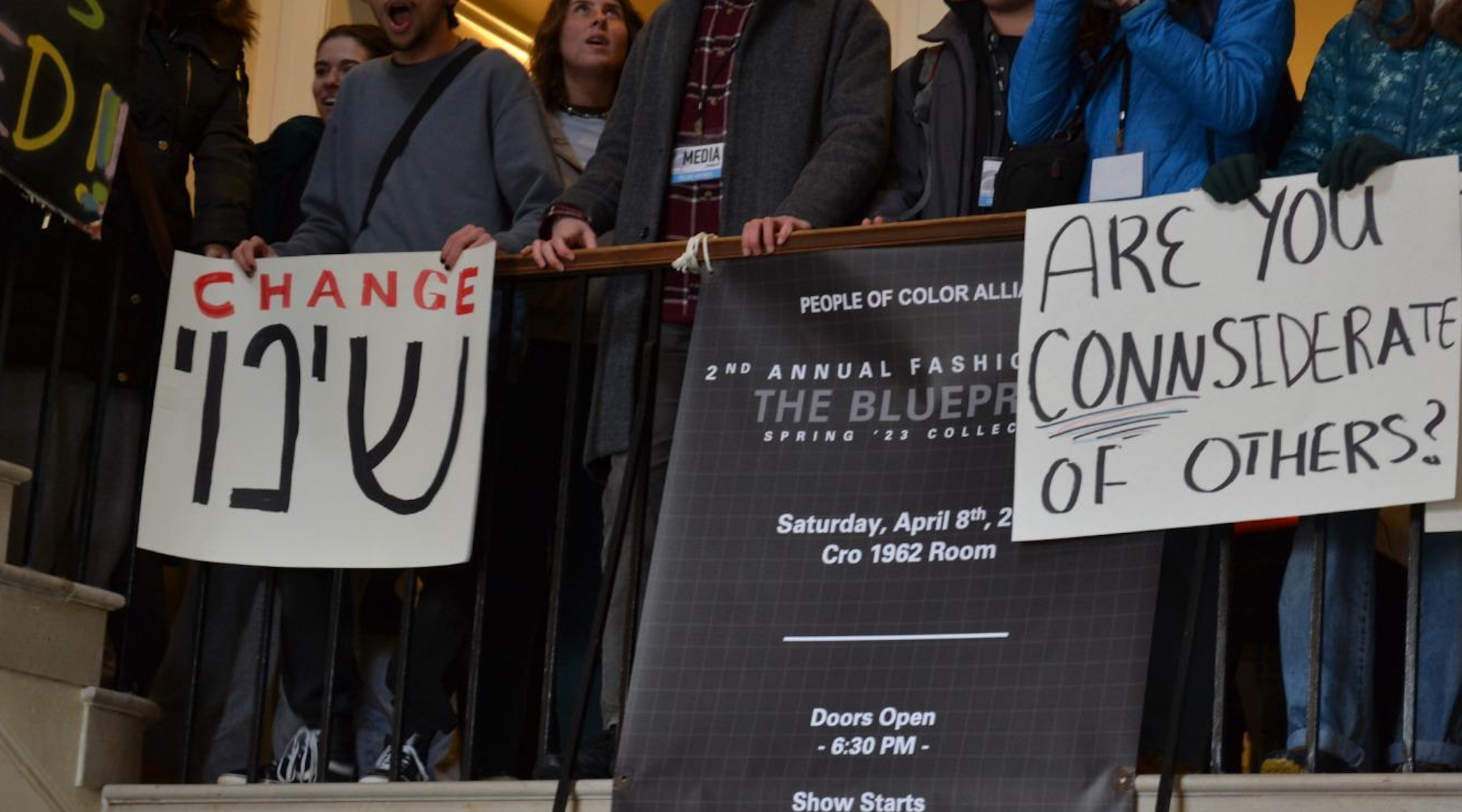Connecticut College students are in revolt after president’s planned talk at Florida club with antisemitic and racist past
Jewish students can feel excluded from campus protests. At Connecticut College they’re leading helping lead the charge.

Connecticut College students are protesting against their school’s president, Kathy Bergeron, who had been scheduled to speak at a venue with an antisemitic and racist history. (Courtesy of Hannah Foley/The College Voice)
(JTA) – When students at Connecticut College learned that their president had been planning to attend a fundraiser at a historically racist and antisemitic golf club, they began to organize.
But their school’s building for race and ethnicity programming, the Unity House, didn’t have enough space to hold them all. So a pivotal meeting that kicked off a weeks-long campaign against the university took place at a space with a larger capacity: its Hillel house.
“Having a Jewish space on campus that felt like a safe space to gather as a community is something that really struck me as important,” Ilan Listgarten, a Jewish sophomore at the college, told the Jewish Telegraphic Agency.
Three weeks later, Connecticut College students have moved to an even bigger location: They have occupied a central administrative building on the New London campus for five days and counting, and are receiving support from faculty and staff.
The students want the president to resign, and they are calling for increased funding and support for various ethnic studies and student group programs. Their demands include enhancements to the Jewish studies program (the school currently offers a minor) and bias training to address antisemitism.
Tensions have remained so high that Hillel leaders canceled a planned Shabbat dinner with the embattled president, Katherine Bergeron, an annual event that this year had been scheduled for Friday.
As Jewish students and faculty on other campuses have complained that they feel excluded from progressive activism, the crisis at Connecticut College has gone in a different direction. Jewish students are playing a leadership role in the protests, working closely with a coalition of activists from other backgrounds who specifically invited Hillel to join in its efforts. That’s notable because, at other schools across the country, recruiting support from coalitions of minority groups has been a hallmark of pro-Palestinian activists — who often boycott (or are themselves barred from) Hillel due to its pro-Israel stance.
“I’ve felt even more proud to be Jewish on campus right now,” sophomore Davi Schulman, a student journalist and member of Connecticut College Hillel’s leadership team, told the Jewish Telegraphic Agency. “And I’m just proud to be a Connecticut College student. We’re really coming together like we never have before.”

Connecticut College students are protesting against their school’s president, Kathy Bergeron, who had been scheduled to speak at a venue with an antisemitic and racist history. (Courtesy of Sam Maidenberg/The College Voice)
Key to Hillel’s participation, observers said, was the fact that the kindling for the student uprising involved antisemitism. Bergeron had been planning to attend a fundraiser for the college to be held at the Everglades Club, an exclusive golf club in Palm Beach, Florida, that has a history of denying entry and membership to Jews and Black people (reportedly including Black Jewish entertainer Sammy Davis Jr. and Jewish cosmetics mogul Estée Lauder).
Today the club is secretive about its current membership policies, though recent testimony from officials has claimed that the club no longer discriminates against Jews. Its antisemitic past was enough to turn off former President Donald Trump from selling his Mar-a-Lago club to them in the 1990s.
The larger campus community became aware of the fundraiser only after the school’s dean of institutional equity and inclusion, or DIEI, resigned from his position Feb. 7 after only a year on the job, citing the president’s unwillingness to take his advice to cancel the fundraiser. Bergeron announced the next day that the event had been canceled and apologized “to all who saw our plans as contrary to Conn’s values or to the inclusive institution we aspire to be.”
The dean had leaked his resignation letter to a group of student activists, sparking the initial efforts to organize what became Student Voices for Equity — and that meeting in the 6,700-square-foot Zachs Hillel House. Jewish students suggested the venue, opened in 2014 to serve the school’s roughly 200 Jewish students, when it became apparent that the crowd of hundreds wouldn’t fit in Unity House.
The controversy over the fundraiser was “the straw that broke the camel’s back,” according to Rabbi Susan Schein, the director of Connecticut College Hillel (and an employee of the university’s diversity and equity office). She and students said there had been long-standing dissatisfaction among many on campus with Bergeron’s leadership; several students said they wanted to see more funding and support for ethnic studies and diversity-focused programs.
When the student activists approached Hillel’s student leadership about having a Jewish representative join their efforts, the students quickly agreed, electing to have Listgarten play the role; today he is helping to support the around 30 students who are occupying the campus building where the president’s office is located. The Hillel also issued a statement standing in solidarity with the movement’s goals.

Connecticut College sits along the Thames River in New London, Connecticut. It enrolls about 200 students. (Connecticut College)
A Connecticut College spokesperson told JTA that Bergeron and the school’s administration “take the issues that have been raised seriously,” and that it would conduct an independent review into “the workplace-related concerns.” The college also pledged “significant additional resources” into its diversity-focused efforts. It did not address how the planned fundraiser at the country club had come together. Bergeron has sent six letters to the campus community about the controversy since the diversity dean’s initial resignation.
The ease with which the campus’s Jewish community has fit into this movement is a testament to deliberate programming efforts at the Hillel to reach out to forge relationships between Jews and non-Jews on campus, Listgarten and Schein said. Hillel hosts events like “Unity Shabbat” designed to bring together other marginalized groups, and its center — which includes a game room — was envisioned by funder Henry Zachs as a common space for Jews and non-Jews alike, Schein said.
It wasn’t always this way at Connecticut College. In 2015, the school attracted national attention when a student decried as racist a months-old Facebook post by a Jewish professor about the previous year’s conflict in the Gaza Strip. The professor had ambiguously used an analogy of “rabid pit bulls,” without specifying whether he was talking about Hamas or all Palestinians.
In the resulting furor, hundreds of students and alums signed an online petition demanding the college condemn “the racism and dehumanization” of his post. Pro-Israel activists came to the professor’s defense and accused the campus community of being hostile to Jewish and pro-Israel views.
Today, Listgarten said, Israel hasn’t come up in this current period of student activism, and dialogue between Jews and non-Jews remains civil. He confirmed Bergeron has also hosted annual Shabbat dinners with Hillel students. But this year, after the fundraiser controversy broke into view, Hillel leadership elected not to dine with her for their scheduled Shabbat dinner, which would have taken place Friday.
“The Hillel Board has very clear values of tzedek,” Listgarten said, using the Hebrew word for “justice.” “As soon as this event occurred and it was clear that our values were drastically opposed to that of the president, we canceled.”
Despite their warm reception, Schulman said she’s “conflicted” by the fact that the other campus activists “consistently mentioned the Jewish community on campus and included us in the group of marginalized students.” To her and the other Hillel leadership, the Jewish community has “privilege” that students from some backgrounds don’t, and they’ve made that a central part of their messaging. They cite the existence of the Zachs Hillel House itself, and the fact that it is in better condition than other university spaces devoted to race and ethnicity programming, as one example.
“We don’t want to appear to be pushing any kind of agenda or whatever,” Schulman said. “We’re kind of taking a step back and supporting everyone who is expressing their feelings.”
This dynamic has been crucial to Hillel’s success at ingratiating itself with larger campus culture, Schein said. She invoked Jewish teachings by way of explanation.
“The country club issue that came up involved antisemitism, and I think that caught the attention of the Jewish students. But here they recognized it is not just about themselves, and that they have a responsibility to support others,” Schein said.
Citing the famous quote by Rabbi Hillel, the campus group’s namesake, she added, “They stepped into it. They could’ve been outside, but they said, ‘Now is the moment to support our DIEI colleagues. And that’s what the campus is doing. They said, ‘If not now, when?’”
This article originally appeared on JTA.org.
A message from our Publisher & CEO Rachel Fishman Feddersen

I hope you appreciated this article. Before you go, I’d like to ask you to please support the Forward’s award-winning, nonprofit journalism so that we can be prepared for whatever news 2025 brings.
At a time when other newsrooms are closing or cutting back, the Forward has removed its paywall and invested additional resources to report on the ground from Israel and around the U.S. on the impact of the war, rising antisemitism and polarized discourse.
Readers like you make it all possible. Support our work by becoming a Forward Member and connect with our journalism and your community.
— Rachel Fishman Feddersen, Publisher and CEO





















